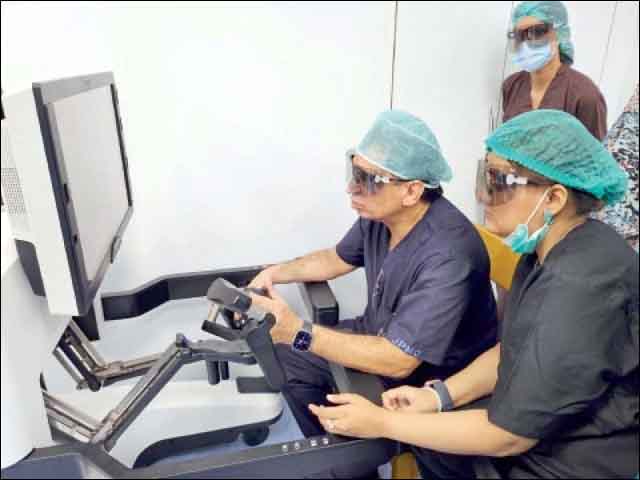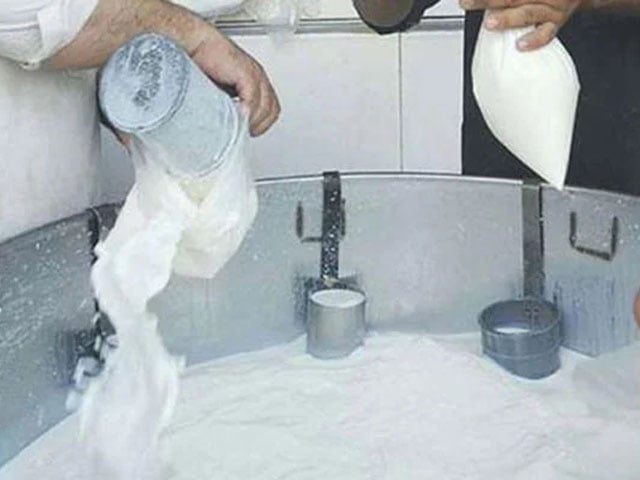Karachi: The Sindh Health Department has canceled the tender of 4 robotic systems ordered for Jinnah Hospital, Gambit Hospital and Lums Hospital.
Caretaker Health Minister Sindh said that government hospitals have been instructed to use robotic surgery only for complex operations instead of minor operations to avoid wastage of financial resources.
Talking to Express in his office, Caretaker Health Minister of Sindh Dr. Saad Khalid Niaz said that I am not a surgeon, so I cannot tell the difference between laparoscopy and robotic surgery in depth, but I definitely know that if through laparoscopy, If removed, the patient is discharged from the hospital the next day.
He said that in a private hospital, around Rs. In Jinnah and Civil Hospital, the fees for laparoscopy operation are less than in private hospitals. I have not stopped any robotic surgery, I had a request to procure 6 robotic systems, but I have canceled the tender for 4 robotic systems procured for Jinnah Hospital, Gambit Hospital and Lums Hospital.
He said that my question in this regard is that such a health department or such a hospital where the emergency and basic medical facilities are not complete and the roofs are falling down, these needs should be met or any new technology should be introduced? Hospitals in many countries around the world have robotic surgery facilities, but despite this, they do not perform gallbladder removal operations with robots.
The caretaker provincial minister said that we have 6 robotic systems costing about 5.7 billion rupees. Each case will cost at least 1500 dollars (Rs. 4.5 lakhs). I consulted the best and international surgeons in the city and they also believe the same.
If a robotic system performs 300 to 350 operations per year, then 6 robotic systems will perform a total of around 2000 operations per year as an average cost per operation is 5 lakhs. Therefore, when I multiplied 2 thousand by 5 lakh, the total cost of annual operations from these 6 robotic systems has come to one billion rupees.
The health minister said that I asked the hospital authorities that where will this 100 crore rupees come to you? So he said that its budget will also be required from the Sindh Health Department. I said that there should be an account for this too. That is, first bring 6 robotic systems worth 5.7 billion rupees and after that 100 crore rupees will have to be given annually for operations.
He said that standard laparoscopic surgery is not being done in most of the government hospitals of Sindh. Most of the government hospitals do not have emergency and basic medical facilities. A small hospital (secondary health care facility) has a medicine budget of 6.5 crores. About 3,000 patients come to the accident department of Jinnah Hospital every day.
According to estimates, more than one lakh patients come to Jinnah Hospital’s accident department every month and about 12 lakh patients come annually. So my question is to spend Rs 50 crore to improve accident department of Jinnah Hospital and benefit 12 lakh patients? Or should I spend Rs 100 crore on robotic surgery which will only marginally benefit patients who already have all the resources to undergo the operation?
Aga Khan University Hospital and Liaquat National Hospital do not have robotic systems. Both are the best and quality hospitals and training centers in the country. In my opinion, robotic surgery in this situation is a waste of money. So I have instructed the hospital administration that no more robots are needed, so use the robotic systems that have come.
There is no need to do all the operations with the robotic systems here. Only complex surgeries should be performed by robotic surgery. In this regard, the details of every robotic surgery will be taken from the hospital because the Sindh Health Department will not allow the unnecessary use of robotic systems for only bile extraction or minor surgery.
He said that keeping all these things in mind, Jinnah will support the robotic system installed in the hospital. Civil Hospital previously had a robotic system, which was jointly used by SIUT and Civil Hospital Karachi. Sindh Government is the largest donor of SIUT. So I have requested the SIUT authorities to share one of their robotic systems with the civil hospital. Share 3, 3 days between us, this will save us the need to purchase more robotic systems. .
Look at the conditions of Lums Hospital in Hyderabad and then determine whether that hospital can now take a step towards robotic surgery or not. Patient Aid Foundation is a good charity of Jinnah Hospital. If Patient Aid Foundation buys and hands over robotic systems to Jinnah Hospital, then it is their wish, but this is not possible with the budget of Sindh Health Department.
He said that the budget of the Sindh Health Department should be used to improve the facilities of the hospital. Patient Aid Foundation has built state-of-the-art operation theaters at Jinnah Hospital, but visit the accident departments of other hospitals including Jinnah Hospital and Civil Hospital. We have to make the best use of limited resources. We should provide medical equipment for laparoscopy which is also cheap and it will also improve the quality of laparoscopy.
The Caretaker Health Minister said that if the authorities of Jinnah Hospital are thinking that their second robot has been tendered and they can bring another robotic system, then I tell them in clear words that nothing like this is going to happen. I told the hospital authorities that if you give me a serious reason to bring more robotic system, I will give permission. Starting robotic surgery in Jinnah Hospital is an experiment. Robotic surgery has already failed once in the past.
He said that 10 CT Scans and 3 MRIs are currently inactive in Sindh. I prioritize them first. These diagnostic machines also did not have a service contract. The company increased the price of the robotic systems and offered the hospital robotic systems for 100 operations for $1500. In the beginning, the company can bear the cost of some operations, but later the budget will be asked from the Sindh Health Department.
He further informed that the Jinnah Hospital officials said that robotic surgery is performed to avoid complicated steps, pain and blood loss during the operation, thanks to which the patient can recover quickly and engage in normal activities. Initial 300 cases. The cost will be borne by the company. In Jinnah Hospital, it was decided to ensure infection-free treatment by performing 2 operations per day using a robot, but now following the instructions of the Sindh Health Department, only certain operations will be performed with robotic surgery.
(function(d, s, id){
var js, fjs = d.getElementsByTagName(s)[0];
if (d.getElementById(id)) {return;}
js = d.createElement(s); js.id = id;
js.src = “//connect.facebook.net/en_US/sdk.js#xfbml=1&version=v2.3&appId=770767426360150”;
fjs.parentNode.insertBefore(js, fjs);
}(document, ‘script’, ‘facebook-jssdk’));
(function(d, s, id) {
var js, fjs = d.getElementsByTagName(s)[0];
if (d.getElementById(id)) return;
js = d.createElement(s); js.id = id;
js.src = “//connect.facebook.net/en_GB/sdk.js#xfbml=1&version=v2.7”;
fjs.parentNode.insertBefore(js, fjs);
}(document, ‘script’, ‘facebook-jssdk’));


